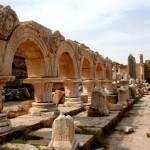 Libya has some of the most extensive and well-preserved ancient Roman and Greek remains, thanks to the dry Saharan air and its political isolation. Once it opened its borders, however, especially after 2003, the looting gangs saw their chance and went to town.
Libya has some of the most extensive and well-preserved ancient Roman and Greek remains, thanks to the dry Saharan air and its political isolation. Once it opened its borders, however, especially after 2003, the looting gangs saw their chance and went to town.
Now locals shamelessly — one even goes on the record in the article — dig, chisel and plunder these once-pristine sites for a few bucks on the black market, and so far the Libyan government hasn’t even acknowledged the extent of the problem, never mind tried to solve it.
In fact, they’ve actually reduced the budgets of state antiquities departments, so fewer employees make even less money. Selling 10 Roman coins would make them more money than their monthly salaries.
But the prevailing sentiment towards the pre-Islamic sites in this fervently faithful and almost exclusively Muslim country is disinterest. Even at Leptis Magna, a sprawling, almost intact city that is the crown jewel in Libya’s Roman heritage, lackadaisical policemen monitor the occasional clutches of tourists wandering through. Locals shepherd flocks of sheep through ruins strewn with empty plastic bottles or across pebbled beaches littered with ancient pottery shards, column-heads and inscriptions.
When Donald White, an archaeologist at the University of Pennsylvania who has excavated Libyan sites since the 1960s, last visited Cyrene, he came across a man hacking a marble head off of a statue with one hand while he smoked a cigarette with the other.
There is hope for the future, though. Qadafi’s son, Saif-ul-Islam, is launching a major ecotourism initiative known as “Green Mountain”. The archaeological sites are part of the program, so there’s a whole new incentive to preserve these gems.
On another note, the author of this article, Iason Athanasiadis, was arrested in Tehran on June 19th for “reasons conflicting with journalism and in relation with the recent street riots”. He was the only non-Iranian journalist to have been jailed after the election protests. According to Reporters Without Borders, he was released July 5th.
Although Leptis Magna IS wonderful, you might expect people to maximise their income in all poorer nations as best they can. But Libya is sloshing around with oil money. It has one of the highest GDPs in the entire continent, and money is being poured into health and education.
So something else must be going on. Why are the enormous oil profits not being shared equally throughout Libyan society?
Good question. The usual slate of corrupt officials and profiteers, I suspect. They don’t even have the balls to stand up to Egyptian smugglers, so clearly their priorities are more along self-preservation lines.
A sad story.
So far it is indeed. I’m hoping it has a happy ending though.